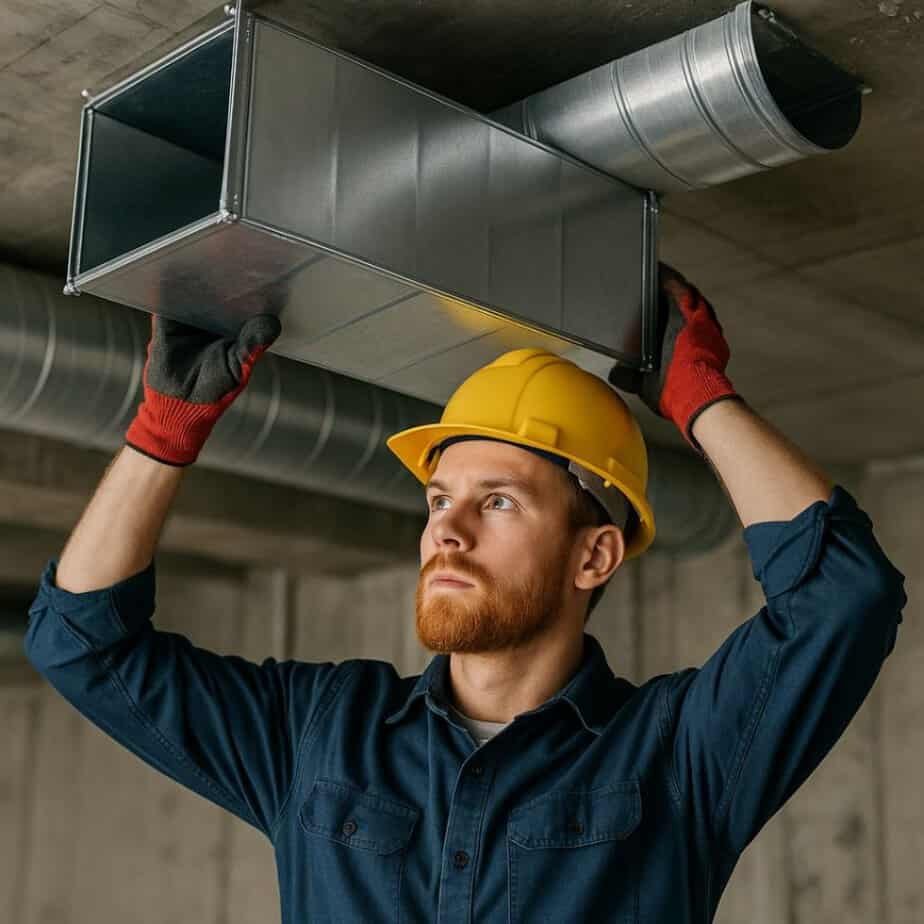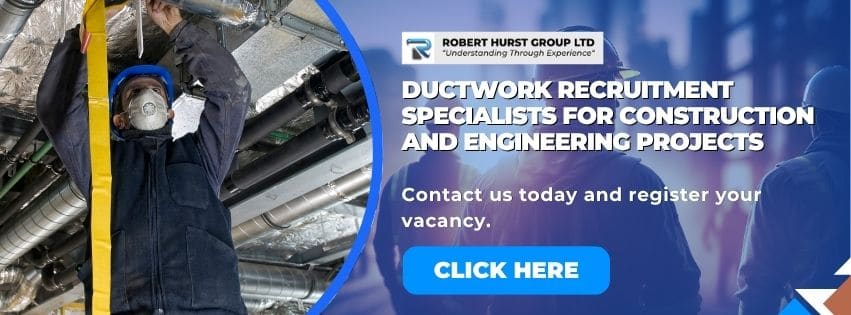Why Getting Ductwork Installation Recruitment Right Matters
Hiring the wrong ductwork installer doesn’t just delay your build — it puts your entire project, including client trust and budget, at risk. Within mechanical and electrical (M&E) contracts, ductwork professionals play a crucial role in the success of HVAC systems. A subpar hire can lead to significant errors, including incorrect duct routing, poor air balancing, failed inspections, or even unsafe working conditions.
These are not just operational issues — they’re also reputational ones. Delays in ductwork installation can cause knock-on effects throughout the M&E delivery chain, frustrating clients and damaging long-term business relationships. That’s why investing in innovative recruitment practices is not a luxury; it’s a necessity.
When it comes to ductwork installation job recruitment, UK firms can’t afford to take chances. At Robert Hurst Group Ltd., we specialise in sourcing experienced, compliant ductwork professionals for construction and M&E companies nationwide. In this post, we reveal the common pitfalls and share expert tips to help you get your next hire right, the first time.

What Makes Ductwork Installation Roles So Specialist?
Ductwork installation involves much more than fitting a few metal ducts. Installers must be able to interpret mechanical drawings, handle a wide range of fabrication materials, and perform precise measurements in varied, sometimes restricted, environments. From spiral duct to rectangular trunking, the job demands trade-specific training and hands-on experience.
Additionally, installers must navigate the intricacies of different building types — including commercial, residential, and industrial — each with its unique airflow, fire safety, and insulation considerations. The UK’s focus on energy efficiency and compliance with updated Building Regulations (such as Approved Documents F and L) means only competent installers can meet performance standards.
The demand for NVQ Level 2 or 3 qualifications, CSCS accreditation, and strong health and safety knowledge is non-negotiable. Yet many recruiters fail to screen for these essentials, putting clients at risk. A specialist recruiter like RHG knows how to spot the difference between a general labourer and a ductwork professional ready for the site from day one.
The Biggest Recruitment Mistakes M&E Firms Make
Relying on Generic CVs and Job Boards
Generic job boards are packed with CVs from general labourers or candidates outside the HVAC or M&E trades. Without proper screening, this approach produces high volumes of unsuitable applicants and wastes precious time. For ductwork roles that require precision and safety-critical thinking, that’s not good enough.
This problem compounds when in-house teams lack the time or industry understanding to vet each application properly. That’s why outsourcing to an experienced recruiter with niche knowledge, like RHG, can radically reduce your interview-to-hire ratio. It enables hiring managers to focus solely on candidates who have already passed key trade and compliance checks.
A specialist recruiter also utilises refined job-matching algorithms, trade-specific databases, and insider networks to reach passive candidates — those who aren’t actively searching for generic job boards but are open to the right opportunity.
Underestimating Project-Specific Needs
Ductwork projects vary massively in scope. A candidate may thrive in small residential installations but struggle with the scale, regulation, or teamwork required on large commercial sites. Employers who assume that “a duct fitter is a duct fitter” risk bringing in the wrong skillset entirely.
Recruiting based on job title alone is a recipe for rework. The correct process involves reviewing past projects, material familiarity (e.g., galvanised vs. stainless steel, pre-insulated ducting), and experience with similar systems (e.g., smoke extraction vs. fresh air intake). At RHG, we ask the right questions and vet for absolute project alignment — not just box-ticking.
Additionally, we assess soft skills such as communication, initiative, and the ability to follow method statements — all of which are critical on busy UK construction sites governed by tight schedules and stringent health & safety expectations.
Hiring on Speed Instead of Skill
We understand the urgency of hiring in the construction and, maintenance and engineering (M&E) sectors. But speed without skill is a false economy. Rushing a hire to meet a start date can result in significant losses down the line, from safety breaches to costly rework.
That’s why RHG delivers both speed and precision. Our extensive talent pool enables us to often provide fully vetted ductwork installers within 24–72 hours, without compromising on quality. We always cross-check references, skills, and site readiness before presenting candidates to clients.
Moreover, a “skills first” mindset protects your site’s productivity. It ensures that whoever you hire doesn’t just show up — they deliver value from day one, integrate well with your team, and meet your project’s quality standards.

How to Build a Job Spec That Attracts the Right Talent
The first step to hiring the right person is writing the correct job specification. Too often, firms reuse generic templates or post vague role descriptions, leading to irrelevant applications and unqualified interest. A tailored, clear, and specific job spec attracts candidates who match your needs.
Your specification should include a detailed list of responsibilities (e.g., reading technical drawings, installing galvanised ducting, fixing supports), as well as the qualifications required (NVQ, CSCS, PASMA, IPAF, if applicable). Please remember to specify the location, start date, expected duration, and shift hours. Also, specify PPE and tool requirements.
Optimising your job listing for search engines by using the phrase “ductwork installation job recruitment” helps skilled tradespeople find your role online. RHG supports clients in writing and refining these job specifications to increase reach and relevance to applicants.
Furthermore, consider including a short paragraph about your company’s culture or safety record — this adds professionalism and helps attract reliable workers who value well-managed sites.
Why Partnering with a Specialist Recruitment Firm Pays Off
Recruitment is a high-stakes process, and one that specialist firms like Robert Hurst Group Ltd. are designed to simplify. With years of experience in the M&E and construction sectors, we offer more than candidate searches: we provide workforce solutions that work in real-world project conditions.
We maintain an extensive database of pre-vetted tradespeople across the UK, each with verified qualifications, references, and job-specific skills. Our consultants understand M&E workflows, which allows them to shortlist candidates based on experience, location, certifications, and even personality fit.
Working with a recruitment partner also saves time and reduces turnover. Our placements typically have a higher retention rate than generic hires because we take time to understand both the job and the worker. Plus, we can rapidly scale staffing as your project evolves — a critical asset for firms managing fluctuating workloads.

Vetting Candidates Beyond the CV
Practical Trade Testing & Experience Checks
No matter how polished a CV may appear, there is no substitute for proven, practical experience. That’s why RHG goes beyond the resume to validate whether a candidate is capable of performing the role.
Where appropriate, we conduct practical assessments or technical interviews to verify core skills, including measuring duct runs, handling various materials, and understanding the principles of system airflow. We also request images or portfolios of past work, especially for complex commercial jobs.
Many of our clients have said this level of vetting has dramatically reduced onboarding times and improved site outcomes, because they know their installer can hit the ground running with minimal supervision.
Compliance, Certifications & References
Legal compliance is a significant risk area in the construction recruitment industry. Hiring someone without the proper certifications or right-to-work status can land you in hot water — and even halt work on-site.
That’s why RHG has strict compliance protocols in place. Every candidate is checked for:
- Valid CSCS or equivalent cards
- Right to work in the UK
- Sector-specific tickets (e.g., PASMA for tower work, IPAF for elevated platforms)
- Verified work references from recent employers
These checks provide our clients with peace of mind and significantly reduce the risk of on-site issues, inspection failures, or liability claims.

How RHG Streamlines the Hiring Process
At Robert Hurst Group, recruitment should be efficient, precise, and proactive. That’s why we’ve developed a streamlined process that saves you time, reduces costs, and delivers consistent results.
Here’s how it works:
- Consultation: We start by understanding your exact needs — technical, logistical, and cultural.
- Sourcing & Screening: We match from our internal database and targeted outreach campaigns.
- Vetting: Only fully screened, certified, and experienced candidates are shortlisted.
- Placement: We handle scheduling, onboarding, and communication with candidates.
- Follow-up: We check in regularly to ensure that placements continue to meet expectations.
This transparent, responsive process means you always know where things stand — and can rely on us to deliver when it counts.
Additionally, we integrate modern recruitment tools with personalised service. From applicant tracking systems to client dashboards, our tech ensures efficiency, while our team ensures accuracy and accountability.
Case Study: A Successful Ductwork Installation Recruitment Project
One of our standout placements involved a Tier 1 contractor working on a significant commercial HVAC installation in Manchester. The client had previously experienced delays due to poor agency placements and required a team of four duct installers within 72 hours, all of whom had CSCS cards and experience in large-scale duct systems.
We provided the five shortlisted candidates within 24 hours, and three of them were interviewed the next morning. All were hired and started on-site two days later. The site manager praised their work, and the client met their deadline ahead of schedule.
This success led to further placements on the same site and a wider partnership across the client’s UK projects. The case demonstrates not only our recruitment speed but also our ability to match skills to the setting and need to achieve the desired outcome.
Additionally, by providing real-time feedback and weekly progress updates, we ensured that any evolving site requirements were handled promptly, with zero disruptions and a smooth contractor-client experience.
Conclusion: Ready to Find Your Next Skilled Ductwork Installer?
Recruiting for ductwork installation is not a checkbox exercise — it’s a business-critical decision that affects cost, compliance, and project performance. In today’s competitive construction and M&E landscape, there’s no room for error.
Effective ductwork installation job recruitment requires deep trade knowledge, candidate vetting, and speed — all of which Robert Hurst Group Ltd. delivers as standard. From site-ready professionals to streamlined recruitment campaigns, we take the pressure off your hiring process, allowing you to focus on delivery.
If you’re ready to hire smart, reduce risk, and keep your project on track, speak to our M&E recruitment experts today. We’ll help you fill your ductwork installation roles with skilled, compliant professionals — every time, first and foremost.

